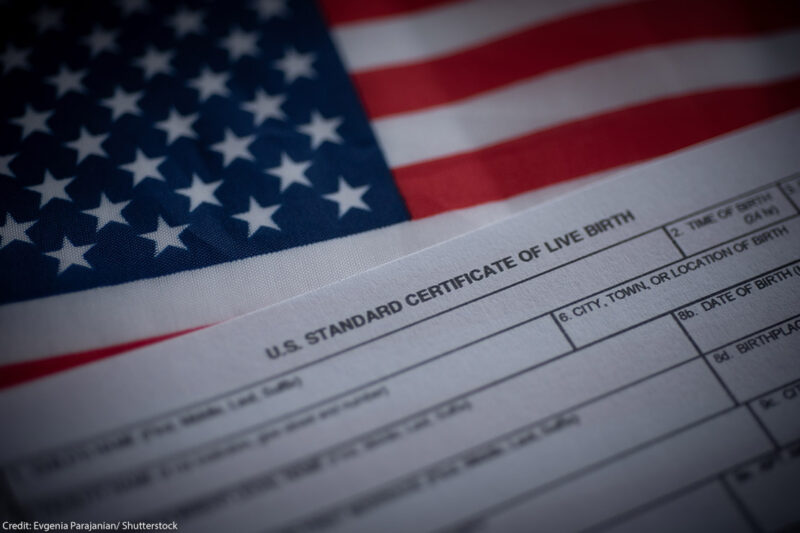A New Challenge to Birthright Citizenship: International Comparisons

On January 20, 2025, shortly after his inauguration, President Donald Trump signed Executive Order 14160, titled “Protecting the Meaning and Value of American Citizenship.” This order sought to redefine the Fourteenth Amendment’s Citizenship Clause, specifying that children born in the U.S. would not automatically acquire citizenship if neither parent was a U.S. citizen or lawful permanent resident. However, this executive order faced immediate legal challenges. Twenty-two states, along with the District of Columbia and the city of San Francisco, filed a separate lawsuit to block the order. On January 23, 2025, Judge Coughen in the Western District of Washington temporarily blocked the order. The judge’s ruling halted the enforcement of the executive order, citing its direct contradiction with the Fourteenth Amendment’s guarantee of birthright citizenship.
Historical Foundation of Birthright Citizenship on the United States
The Fourteenth Amendment, ratified in 1868 in the aftermath of the Civil War, introduced the principle of birthright citizenship to ensure that formerly enslaved individuals could not be denied their rights as citizens. United States v. Wong Kim Ark (1898) was the landmark U.S. Supreme Court case which affirmed the principle of birthright citizenship under the Fourteenth Amendment. In this case, the Court held that the Fourteenth Amendment guaranteed citizenship to all persons born on U.S. soil, regardless of the parents’ citizenship status.
Jus Soli vs. Jus Sanguinis
The debate over birthright citizenship often involves the international legal principles of jus soli (“right of the soil”) and jus sanguinis (“right of blood”). Jus soli is the principle that anyone born on the territory of a state automatically acquires the nationality or citizenship of that state. This principle is central to U.S. birthright citizenship, as guaranteed by the Fourteenth Amendment. Jus sanguinis, on the other hand, grants citizenship based on the nationality or ethnicity of one or both parents, rather than the place of birth.
Comparative International Approaches
Similar to the U.S., Canada uses a jus soli approach, granting citizenship to any child born on Canadian soil regardless of their parents’ citizenship status. Other nations that have adopted a jus soli approach include the majority of South America, Mexico, Jamaica, etc.
The majority of European and Asian countries rely primarily on jus sanguinis for determining citizenship, often supplemented by residency or naturalization laws. For example, in Germany citizenship is based on jus sanguinis, meaning children born to foreign parents do not automatically become citizens. However, a child born in Germany to non-German parents can still acquire German citizenship if one parent has legally resided in Germany for at least five years and holds a permanent residence status (or meets similar criteria, such as related to Swiss nationality). Similarly, under Japan’s Nationality Act, a child only acquires Japanese nationality if at least one parent is Japanese at the time of birth, regardless of the child’s birthplace, however, the child can become a citizen through a naturalization process.
The recent executive order challenging birthright citizenship has sparked legal battles that call into question the longstanding jus soli principle embedded in the Fourteenth Amendment. As international comparisons reveal diverse citizenship models, the future of American birthright citizenship now hinges on forthcoming judicial and legislative decisions.
Article Written by Abena Aidoo
Sources:
The White House, Protecting the Meaning and Value of American Citizenship; THE WHITE HOUSE (Jan. 20, 2025), available at https://www.whitehouse.gov/presidential-actions/2025/01/protecting-the-meaning-and-value-of-american-citizenship/ (last visited Feb. 3, 2025).
American Immigration Lawyers Association, President Trump Signs Executive Order Protecting the Meaning and Value of American Citizenship; AILA (Jan. 20, 2025), available at https://www.aila.org/library/president-trump-signs-executive-order-protecting-the-meaning-and-value-of-american-citizenship (last visited Feb. 3, 2025).
Tierney Sneed, Judge blocks Trump’s ‘blatantly unconstitutional’ executive order that aims to end birthright citizenship; CNN (Jan. 23, 2025, 3:55 PM EST), available at https://www.cnn.com/2025/01/23/politics/birthright-citizenship-lawsuit-hearing-seattle/index.html (last visited Feb. 3, 2025).
Max Matza and Nadine Yousif, Judge blocks Trump’s plan to end US birthright citizenship; BBC NEWS (Jan. 23, 2025), available at https://www.bbc.com/news/articles/c3605g34jx5o (last visited Feb. 3, 2025).
Nate Raymond, 22 Democratic-led states sue over Trump’s birthright citizenship order; REUTERS (Jan. 21, 2025, 11:31 PM EST), available at https://www.reuters.com/legal/lawsuits-challenge-trumps-birthright-citizenship-other-orders-2025-01-21/ (last visited Feb. 3, 2025).
National Archives and Records Administration, 14th Amendment; THE NATIONAL ARCHIVES AND RECORDS ADMINISTRATION, available at https://www.archives.gov/milestone-documents/14th-amendment#:~:text=A%20major%20provision%20of%20the,citizenship%20to%20formerly%20enslaved%20people (last visited Feb. 3, 2025).
United States v. Wong Kim Ark, 169 U.S. 649 (1898).
Scott Bomboy, A look back at the Wong Kim Ark decision; CONSTITUTION CENTER (Jan. 27, 2025), available at https://constitutioncenter.org/blog/a-look-back-at-the-wong-kim-ark-decision (last visited Feb. 3, 2025).
American Immigration Council, Birthright Citizenship in the United States; AMERICAN IMMIGRATION COUNCIL (Oct. 2024), available at https://www.americanimmigrationcouncil.org/sites/default/files/research/birthright_citizenship_factsheet_241017.pdf (last visited Feb. 3, 2025).
Margaret Young, Canadian Citizenship Act and Current Issues; LAW AND GOVERNMENT DIVISION, GOVERNMENT OF CANADA (Oct. 1997, rev. Aug. 1998), available at https://publications.gc.ca/Collection-R/LoPBdP/BP/bp445-e.htm#B.%20Natural-Born%20Citizens(txt) (last visited Feb. 3, 2025).
World Population Review, Countries With Birthright Citizenship; WORLD POPULATION REVIEW, available at https://worldpopulationreview.com/country-rankings/countries-with-birthright-citizenship (last visited Feb. 3, 2025).
Library of Congress, Global Perspectives on Birthright Citizenship; LIBRARY OF CONGRESS, available at https://maint.loc.gov/law/help/birthright-citizenship/global.php (last visited Feb. 3, 2025).
Nationality Act of 22 July 1913, Reich Law Gazette I p. 583 – Federal Law Gazette III 102-1, as last amended by Art. 1 of the Act of 22 March 2024, Federal Law Gazette I no. 104, available at https://www.gesetze-im-internet.de/englisch_stag/englisch_stag.html (last visited Feb. 3, 2025).
Japanese Law Translation, Nationality Act (Act No. 147 of 1950); JAPANESE LAW TRANSLATION, available at https://www.japaneselawtranslation.go.jp/en/laws/view/3784/en (last visited Feb. 3, 2025).
You May Also Like
